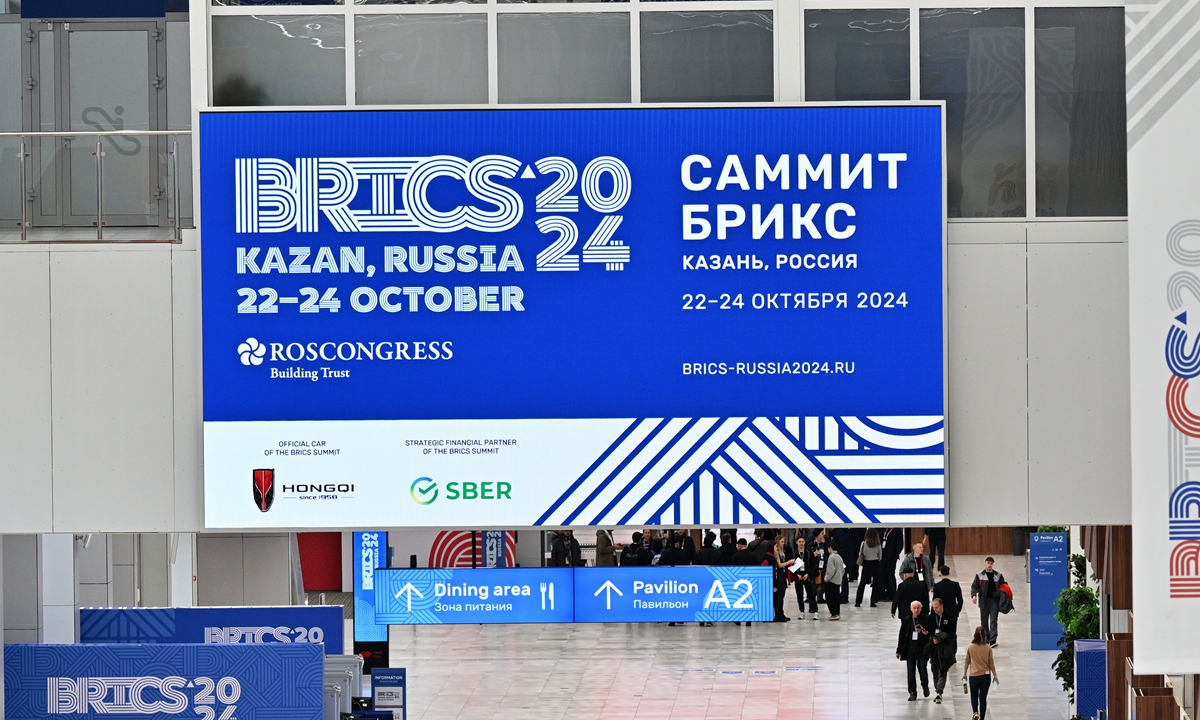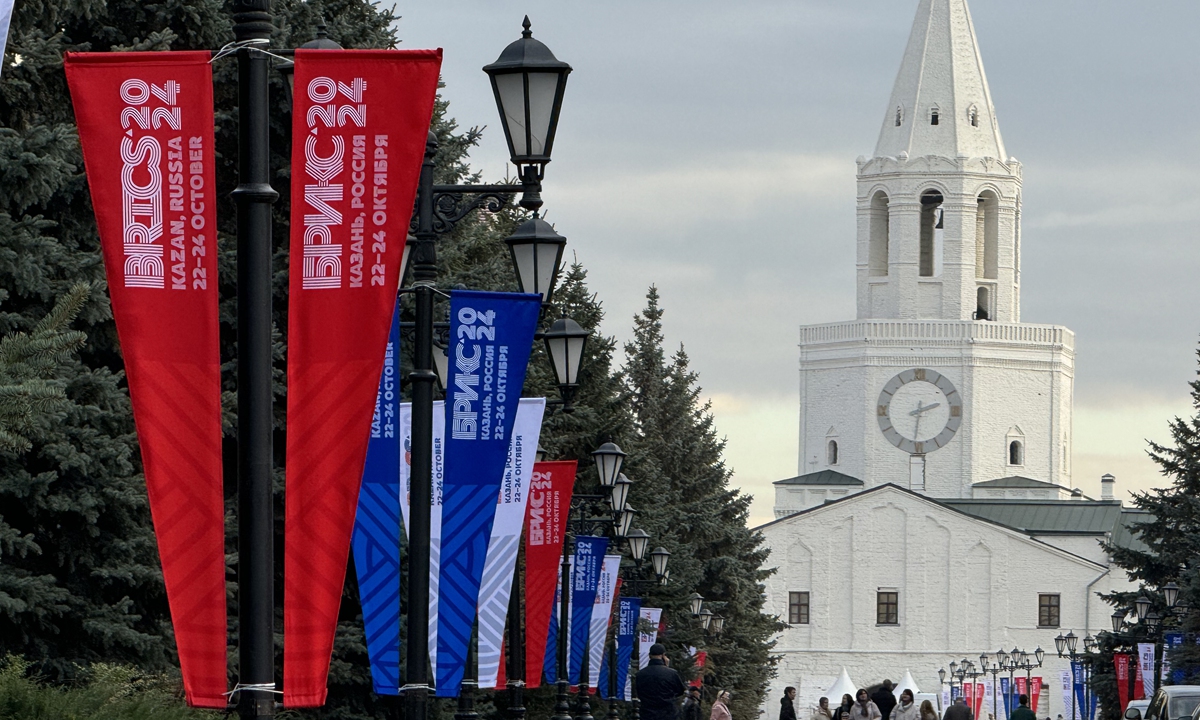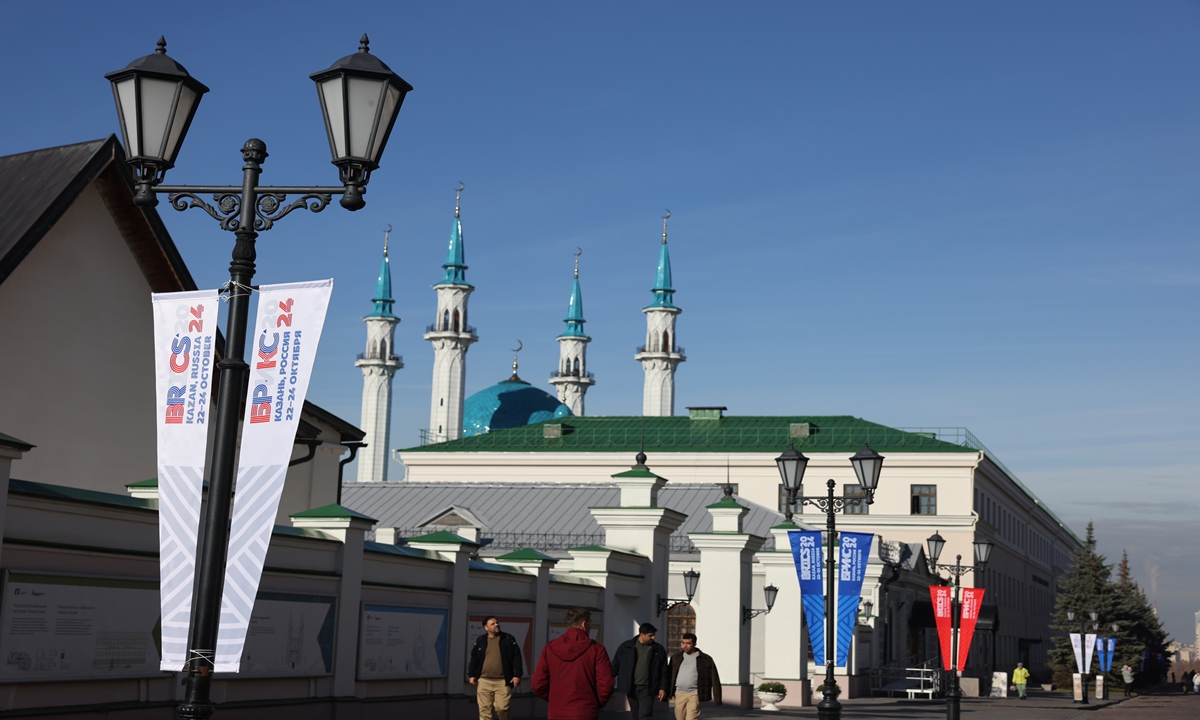
Preparations for the 16th BRICS Summit are underway. The 16th BRICS Summit will be held in Kazan, Russia from October 22 to 24. Photo: VCG
The 16th BRICS Summit, scheduled to be held in Kazan, Russia, from October 22 to 24, has drawn global attention as it marks the first summit since the group's expansion.
This year marks the beginning of greater BRICS cooperation. During the upcoming summit, President Xi Jinping and leaders of other BRICS countries are expected to draw a blueprint for the development of its mechanism, inject new impetus into a multipolar world, facilitate economic globalization and democratization of international relations, and open up a new chapter for the solidarity and development of the Global South, according to Xinhua News Agency.
With global development and security expected to be focused during this summit, experts believe that strengthening financial cooperation within the group could help diversify the global payment system and promote fairness among Global South countries.
Moreover, the BRICS members will likely express their own positions on pressing global security issues. By facilitating discussion among members and upholding multilateralism, the organization provides a new vision for the global governance system, said experts.
Russia's BRICS chairmanship is held under the motto "Strengthening Multilateralism for Equitable Global Development and Security."
"The countries in our association are essentially the drivers of global economic growth. In the foreseeable future, BRICS will generate the main increase in global GDP," Russian President Vladimir Putin told officials and businessmen at a BRICS business forum in Moscow on Friday.
Putin also said that BRICS countries are now working on organizing the exchange of financial information between central banks.
As the overall strength of Global South countries continues to grow and their share in the global economy keeps increasing, there is an urgent need to promote reforms in the international financial and monetary system. This is aimed at enhancing the representation and voice of developing countries and at facilitating the continued diversification of the international monetary system, reflecting the pressing demands and common expectations of emerging economies and developing countries, Chinese Ambassador to Russia Zhang Hanhui told the Global Times during an exclusive interview.
At this year's BRICS Summit, economic and financial cooperation are expected to be among key topics, Wang Youming, director of the Institute of Developing Countries at the China Institute of International Studies in Beijing, told the Global Times on Monday.
Wang Youming said that amid escalating global trade tensions, the push for decoupling by some Western nations, and a growing trend of anti-globalization, the BRICS members are expected to clearly demonstrate their support for an open and inclusive world economy. The alternative payment system possibly to be raised at the summit aims to complement and strengthen the existing international financial framework, promoting fairness, and countering the politicization and weaponization of payment mechanisms often used by certain Western countries, the expert told the Global Times.
According to media reports, dozens of countries, include Malaysia, Thailand, Nigeria, Bolivia and even Turkey, which is a NATO member, have expressed interest or officially filed an application to join BRICS this year.
Experts believe that the organization's economic appeal, and its commitment to inclusiveness — promoting equal discussion and win-win cooperation — have significantly increased its attractiveness to a growing number of applicants.
Following its expansion in 2023, the combined GDP of BRICS countries now accounts for about 30 percent of the global total, with their population representing nearly half of the world's total, and their trade making up one-fifth of global trade. With their growing economic size and increasingly active diplomacy, BRICS countries are steadily increasing their influence in the international decision-making process, according to Xinhua News Agency.
BRICS and the Global South countries have a crucial role in promoting a multipolar order. The New Development Bank (NDB) is, for example, an important platform for overcoming poverty in developing countries, Rafael Gontijo, a Brazilian lawyer and senior advisor of government and international relations, told the Global Times. "I perceive the Bank as a strategic platform for overcoming poverty on a global scale."
Improve global governance
Wang Yi, director of the Office of the Central Commission for Foreign Affairs, called for BRICS members to join hands in addressing security threats at a high-level meeting in September this year.
In the face of current security challenges, BRICS should adopt a long-term perspective, demonstrate a more open attitude, and cooperate more closely to jointly address security threats and resolve security dilemmas, so as to inject positive energy into the turbulent international situation and make new contributions to building a world of lasting peace and universal security, Wang Yi, also a member of the Political Bureau of the Communist Party of China Central Committee, said.
Wang Youming pointed out that as security is indeed a major characteristic of the current international situation, especially in today's context of frequent geopolitical conflicts, BRICS members are also expected to express their own positions and voices, advocating for political and diplomatic solutions that differ from the acts of stoking fires and "handing over knives."
The security outlook of BRICS members is not about one country dominating, rather, it emphasizes common security, sustainable development security, and security through win-win cooperation, Wang Youming noted.
In a recent interview with the Global Times, Kirill Babaev, director of the Institute of China and Modern Asia at the Russian Academy of Sciences, remarked that BRICS has transformed from its original concept into a robust cross-continental cooperation network, now embodying a new vision for the global governance system.
"Its principles are mutual respect for all, inclusive security, fair treatment and non-dominance. These are exactly what the global majority, tired of Western pressure, are now seeking," he added. "BRICS symbolizes a hope for a fair global economy without sanctions and protectionism. I really expect BRICS to become a cornerstone in a new international relations system, not only in economic terms, but in terms of global security."
The BRICS grouping will play a pivotal role in global governance, addressing the multifaceted challenges faced by developing countries through policy coordination and advocacy. By completing their ambitious development agenda, the BRICS nations will demonstrate the efficacy of South-South cooperation in driving sustainable development, Ahmed Moustafa, director of the Asia Center for Studies and Translation in Egypt, told the Global Times.




